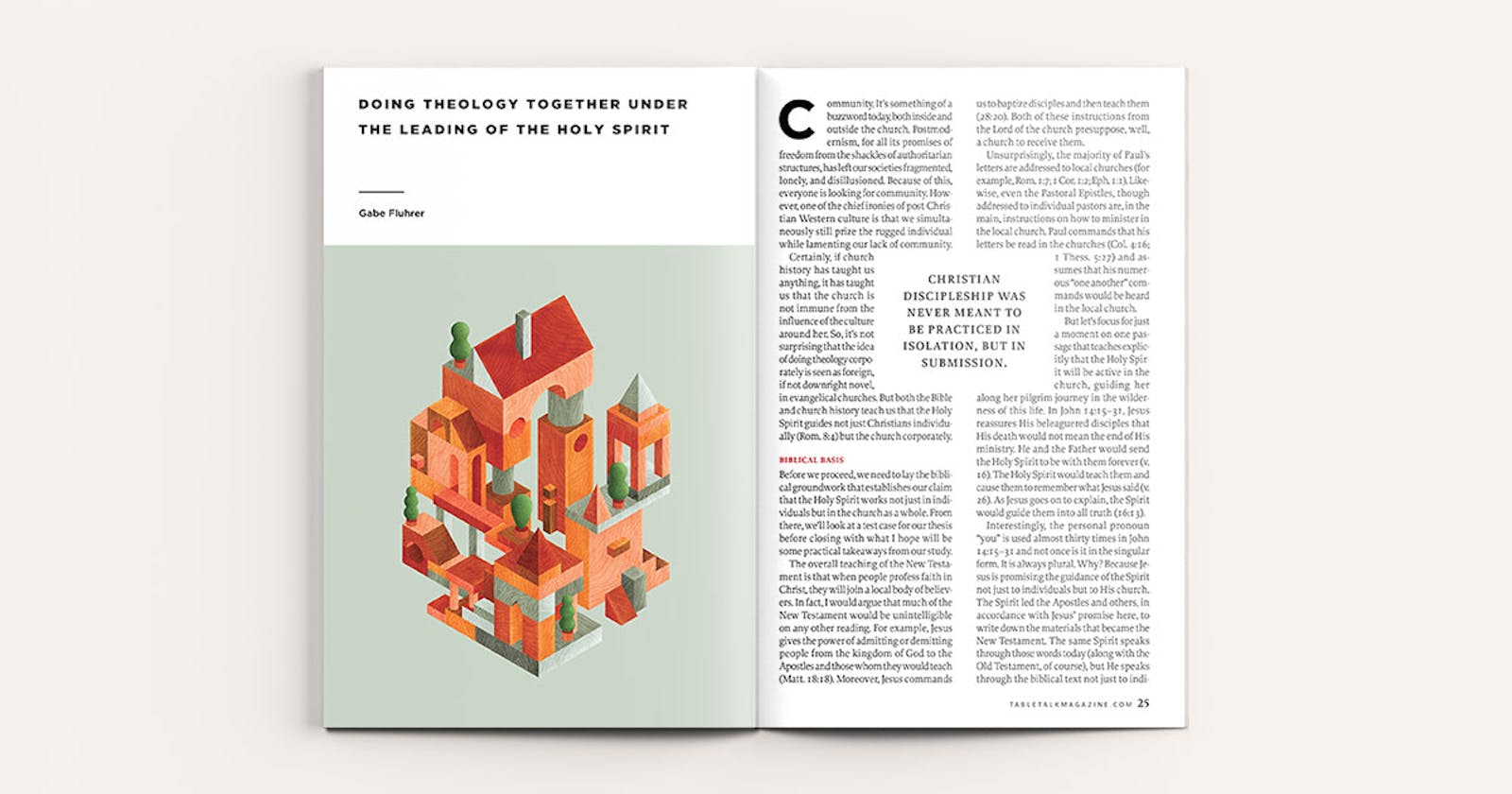
Request your free, three-month trial to Tabletalk magazine. You’ll receive the print issue monthly and gain immediate digital access to decades of archives. This trial is risk-free. No credit card required.
Try Tabletalk NowAlready receive Tabletalk magazine every month?
Verify your email address to gain unlimited access.
Community. It’s something of a buzzword today, both inside and outside the church. Postmodernism, for all its promises of freedom from the shackles of authoritarian structures, has left our societies fragmented, lonely, and disillusioned. Because of this, everyone is looking for community. However, one of the chief ironies of post-Christian Western culture is that we simultaneously still prize the rugged individual while lamenting our lack of community.
Certainly, if church history has taught us anything, it has taught us that the church is not immune from the influence of the culture around her. So, it’s not surprising that the idea of doing theology corporately is seen as foreign, if not downright novel, in evangelical churches. But both the Bible and church history teach us that the Holy Spirit guides not just Christians individually (Rom. 8:4) but the church corporately.
Biblical Basis
Before we proceed, we need to lay the biblical groundwork that establishes our claim that the Holy Spirit works not just in individuals but in the church as a whole. From there, we’ll look at a test case for our thesis before closing with what I hope will be some practical takeaways from our study.
The overall teaching of the New Testament is that when people profess faith in Christ, they will join a local body of believers. In fact, I would argue that much of the New Testament would be unintelligible on any other reading. For example, Jesus gives the power of admitting or demitting people from the kingdom of God to the Apostles and those whom they would teach (Matt. 18:18). Moreover, Jesus commands us to baptize disciples and then teach them (28:20). Both of these instructions from the Lord of the church presuppose, well, a church to receive them.
Unsurprisingly, the majority of Paul’s letters are addressed to local churches (for example, Rom. 1:7; 1 Cor. 1:2; Eph. 1:1). Likewise, even the Pastoral Epistles, though addressed to individual pastors are, in the main, instructions on how to minister in the local church. Paul commands that his letters be read in the churches (Col. 4:16; 1 Thess. 5:27) and assumes that his numerous “one another” commands would be heard in the local church.
But let’s focus for just a moment on one passage that teaches explicitly that the Holy Spirit will be active in the church, guiding her along her pilgrim journey in the wilderness of this life. In John 14:15–31, Jesus reassures His beleaguered disciples that His death would not mean the end of His ministry. He and the Father would send the Holy Spirit to be with them forever (v. 16). The Holy Spirit would teach them and cause them to remember what Jesus said (v. 26). As Jesus goes on to explain, the Spirit would guide them into all truth (16:13).
Interestingly, the personal pronoun “you” is used almost thirty times in John 14:15–31 and not once is it in the singular form. It is always plural. Why? Because Jesus is promising the guidance of the Spirit not just to individuals but to His church. The Spirit led the Apostles and others, in accordance with Jesus’ promise here, to write down the materials that became the New Testament. The same Spirit speaks through those words today (along with the Old Testament, of course), but He speaks through the biblical text not just to individuals only, but also to His church. Put in Southern terms, “God does theology not just with you but with y’all!” Christian discipleship was never meant to be practiced in isolation but in submission, first to Christ and His Spirit-inspired Word, and second through those with whom the Lord has gifted His church to serve with gifts of teaching and preaching (see Eph. 4:11–12; Heb. 13:7).
Historical Precedent
Not only is there biblical precedent for doing theology in community, but the practice is well attested throughout church history. In his massive multivolume work on the history of Scripture and preaching in the church, Hughes Oliphant Old offers a picture of the historical situation out of which Jesus and the Apostles learned to do theology. He writes, “The Judaism from which Jesus and the apostles came exercised the ministry of the Word not only in the reading and preaching of the word in the synagogue but also in the regular study sessions of the rabbinical schools.” In other words, theology was done in community in ancient Israel. Moreover, our Lord and His Apostles would have also been well tutored in the oral traditions of the Midrash and the Mishnah, which were a standard part of Hebrew schooling, again highlighting the communal focus of interpretation.
This kind of study was not reserved only for the scholars among the Jews. Old observes, “The study of Scripture and tradition was not a task reserved to the priesthood or to the rabbis, or to any kind of professional office. It was both the sacred duty and the heavenly delight of every devout Jew.” Notice here the balance we have already perceived in the Scriptures themselves; namely, the study of Scripture was both a corporate and individual exercise.
Nor was this simply an ancient Jewish phenomenon. A friend just returned from his first trip to Israel. While there, he had the pleasure of enjoying a meal in the Old City with a group of rabbis on the eve of the Jewish Sabbath. My friend then recounted what happened. First, the presiding rabbi would recite a portion of the Old Testament in Hebrew. Then the other rabbis would discuss it for about twenty minutes. The whole exercise began around 8:30 p.m. Weary from travel, my friend eventually left at 11 p.m., when the rabbis were still going strong. The next day, he saw the lead rabbi, who promptly informed him that, as was their practice, they finished around 2 a.m.
The writings of the Reformers give ample evidence to their continuing this very Jewish way of doing theology. From the earliest Reformers to the Puritans, they were in conversation with everyone from early Jewish commentators to the church fathers to contemporary writers. They never did theology in isolation but instead learned from the writings of the past while in no way letting those writings obscure the absolute authority of Scripture.
Historian Richard Muller summarizes the Reformers’ approach: “They . . . assumed the importance of the voice of the church particularly in interpretive conversation. . . . Exegetes were advised, in manuals of interpretation, to consult commentaries in the older tradition, not as authorities in the Romanist sense but as sound sources of advice and precedent.” In this respect, the modern evangelical church would do well to emulate the method of the early Reformed church that gave birth to her.

Practical Implications
Maybe the main questions that arise at this point are, if the Holy Spirit guides the people of God, why has there been so much error in church history, and why have so many important truths been buried for so long? That’s a fair—and difficult—question. Let me attempt an answer along two lines of reasoning.
First, our Lord makes clear that false teaching will always infect the church until His return (Matt. 24:11). The Apostle Paul predicts the same thing (Acts 20:29; 2 Tim. 4:3–4), while the Apostle John spends two of his three letters focusing on the problem of false teachers. So, it shouldn’t surprise us that we find false prophets, false religions, and false teaching subverting and threatening the gospel. These were commonplace in the early church.
The doctrine of justification by faith alone illustrates this problem. Enterprising Roman Catholic apologists complain that the Protestant doctrine is a novelty in church history. “Where was it before the Reformation?” they ask. While a complete answer is beyond the scope of this article, and the question inaccurately assumes a complete absence of the doctrine prior to the Reformation, we should not be worried by this objection. After all, Paul was already dealing with a full-scale defection from justification by faith alone in Galatia in the first century. Moreover, a well-rounded reading of the Bible would teach us to expect this kind of doctrinal error. Sin makes us think God’s radical grace is too good to be true. The eclipse of justification by faith alone in the medieval church is not evidence of the Spirit’s absence but confirmation of His earlier warnings.
Second, and in conclusion, we must simply return to God’s sovereignty. Why has He allowed so much false teaching? We may not know the particular reasons, but we know the overarching reason: God is sovereign and we are not. He has chosen to do things this way, and we must bow the knee of our frail understanding to His infinite, majestic wisdom.
But let’s not stop there. Let’s remember that even though we may not understand God’s ways, we can trust them all. For, the King of the church, our Lord Jesus Christ, has promised that as He guides His people by His Spirit to glory, they shall prevail against all the ravages of the world. Therefore, may all of us take to heart John Owen’s immortal words, as we do theology, individually and corporately:
For a man solemnly to undertake the interpretation of any portion of Scripture without invocation of God, to be taught and instructed by his Spirit, is a high provocation of him; nor shall I expect the discovery of truth from anyone, who thus proudly engages in a work so much above his ability.
